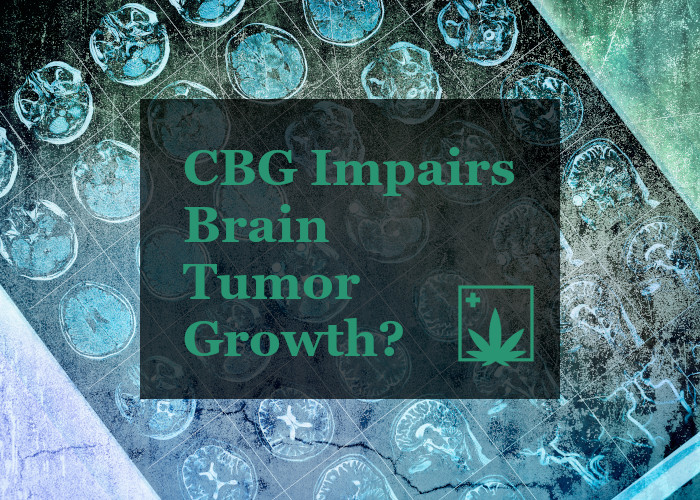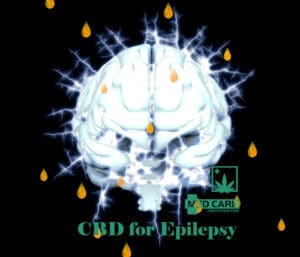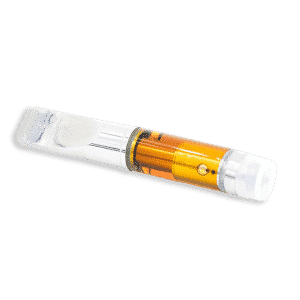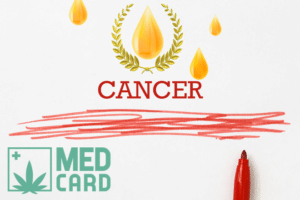
Can CBG Impair Brain Tumor Growth?
- Research suggests that CBG impairs the growth of glioblastoma tumors.
- CBG may also be effective to some extent at killing cancer cells.
- Unlike THC found in marijuana, CBG derived from hemp is non-intoxicating and legal nationwide.
Glioblastoma is one of the most aggressive forms of brain cancer. Some recent research has revealed active compounds in marijuana might suppress the activity of glioblastoma cells or even reduce tumors.
The common cannabinoid compounds, THC and CBD have been in the spotlight for a number of years due to their many healing properties. While THC is famous for its intoxicating effects, CBD is non-intoxicating. Now, recent, cutting-edge investigations are indicating the efficacy of CBG — another non-intoxicating cannabinoid — used in tandem with CBD.
This potent cannabinoid combo of CBG and CBD and their ability to kill off cancer stem cells in vivo is completely novel and does not require THC.
Glioblastoma, according to the American Association of Neurological Surgeons is not only the most prevalent form of brain and central nervous system cancer but also considered one of the most malignant cancers in existence.
This voracious cancer affects approximately one in every 40,000 people. Glioblastomas are difficult to treat or remove due to the highly invasive glioblastoma cell tendrils that permeate deep into the brain tissue.
Glioblastomas tend to appear in the brain or spinal cord. Patients facing this terrible ordeal usually succumb within a year and generally have only a 40 percent survival rate. Treatment for glioblastoma typically involves a combination of chemo, radiation, and surgery.
The medical community is now focused on taming the malignancy of tumors, as opposed to finding a “cure” for cancer. This new focus may enable afflicted patients to enjoy both an improved quality of life as well as a prolonged life expectancy.
So far this tactic has been moderately successful in certain cancers. The life expectancy of glioblastoma patients has only increased by around 15 percent over the last twenty years.
Cannabinoids suppress tumor growth
In recent times, the medical community has studied and subsequently acknowledged the many potential benefits of medical cannabis. Marijuana is frequently used in cancer treatments, as well as nausea suppression, pain relief, anxiety reduction, and appetite enhancement.
Newer studies are unveiling the efficacy of other cannabinoids contained in the marijuana plant. These lesser-known components may indeed play a vital role in drastically slowing and, in some cases, reversing tumor growth in certain cancers, including brain cancers.
However, until recently, THC has been the most prevalent cannabinoid used in the treatment of tumor mitigation. An older study from 2006 in the British Journal of Cancer discussed the clinical trial involving nine glioblastoma multiforme patients who had no success with standard therapies such as radiotherapy and surgery. The patients received various doses of THC directly into their tumors. After a 4 month period, two out of the nine participants indicated that tumor-cell growth was significantly inhibited.
A 2009 study published in the Journal of Clinical Investigation discussed THC’s ability to induce human glioma cell death. The authors of the study came to the conclusion that: “THC can promote the autophagic death of human and mouse cancer cells and provide evidence that cannabinoid administration may be an effective therapeutic strategy for targeting human cancers.”
In a 2018 study titled “Targeting Glioma Initiating Cells with a Combined Therapy of Cannabinoids and Temozolomide,” researchers unveiled some surprising results. TMZ is currently considered to be the most effective agent for the treatment of glioblastoma.
In the study, the team administered TMZ along with a combination of THC and CBD in preclinical glioma models. Their findings indicated that the TMZ and THC/CBD combos containing higher levels of CBD produced a similar antitumoral effect as the administration of TMZ together with THC and CBD.
The authors, upon obtaining the results made the following statement:
“The development of novel therapeutic approaches is urgently needed to improve the survival of the patients suffering this devastating disease. Previous observations by our group and others have shown that Δ9-Tetrahydrocannabinol (THC, the main active ingredient of marijuana) and other cannabinoids including cannabidiol (CBD) exert anti-tumoral actions in several animal models of cancer, including gliomas cells.”
In another study from MGC Pharmaceuticals, Slovenian National Institute of Biology, and the Neurosurgery Dept. at the University Medical Center the three factions teamed up to research and collaborate on a treatment for glioblastoma. The team confirmed the successful research results in early 2020. They had discovered a novel cannabinoid formulation for the treatment of glioblastoma.
The study initially assessed other cannabinoids such as THC, CBD, and CBC and their efficacy in treating glioblastoma. The final results of the research revealed that the lesser-known cannabinoid CBG was the key.
When CBD was combined with CBG the toxicity to glioblastoma cells (cytotoxicity) doubled in efficacy. This doubling effect is attributed to CBD’s ability to inhibit cancer cell viability, while CBG cascades the biological process which leads to “programmed death (apoptosis) of GSCs (glioblastoma stem cells).”
The team concluded by stating:
“The effective power of CBG and CBD to terminate cancer stem cells is completely novel. The ability of this formulation to affect GSCs in vivo, without the need for THC, would enable the development of a therapeutic intervention that is devoid of its psychotropic effects. The next steps for this team will be to focus on testing the delivery systems with the aim to cross the blood-brain barrier. The fact that CBG is the key to be added to CBD for making cannabis a cancer cell killing compound is quite revolutionary as cannabis is a botanical substance, with far less severe side effects when compared to its man-made counterpart treatments including brutal chemotherapy. It is our hope that research like this continues to surface so that future generations can live in a world where cancer fears cannabis and where people don’t fear cancer.”
CBG for glioblastoma tumor suppression
CBG is considered to be the “mother” cannabinoid of THC and CBD. CBG showed early promise for its ability to affect anti-tumor activity on melanoma cells grown in a laboratory. Other studies have identified CBG as a potential heavy-hitter in cancer therapies ranging from colorectal cancer to bone and stomach cancers.
This relative newcomer to the medical-cannabis world is believed to have neuroprotective and anti-inflammatory qualities in addition to acting as a vasodilator.
This makes sense, as both CBD and THC are known to exhibit the same medicinal properties — probably inherited from their “mother,” CBG. CBG however, has received far less attention than her famous offspring.
THC is well known for its unpredictable intoxicating effects, which are not always beneficial to patients suffering from glioblastoma. Some medical professionals believe this psychoactive effect should be avoided at all costs.
Studies have revealed that CBD does not elicit any unfavorable side effects. They also indicate that CBG could be a viable replacement for THC, as it has indicated an ability to effectively kill the deadly Glioblastoma Stem Cells (GSC) which are the “root” of tumor growth.
In fact, studies have further revealed that when CBG was administered, it successfully inhibited up to 90 percent of invasive tendril growth by glioblastoma cells — a vast improvement when compared to chemotherapy which inhibited tendril growth by 50 percent.
Moreover, CBG may have similar influences as CBD and THC on appetite stimulation and nausea resulting from chemotherapy.
Additionally, the research team, when discussing CBG as an alternative to psychoactive THC concluded that “THC has little added value in combined-cannabinoid glioblastoma treatment, suggesting that this psychotropic cannabinoid should be replaced with CBG in future clinical studies of glioblastoma therapy.”
The research team has concluded that targeting GSCs with a combination of CBG and CBD may revolutionize the standard treatments for glioblastoma.
As technology and research evolve, new developments will emerge in regard to the medicinal efficacy of CBG and other cannabinoids for the treatment of all types of cancer.
At present, the results of these studies have yet to be fully determined and will be addressed after further studies on glioblastoma patients.
Research on CBG is beginning to pick up. That’s because, unlike THC which is highly regulated and illegal in many states, products containing CBG derived from hemp are legal nationwide. Anyone can buy CBG online without the need for a medical marijuana card.
Sources and additional reading
- A novel cannabinoid formulation for glioblastoma treatment
- Synthesis and antitumor activity of cannabigerol
- MARIJUANA AND CANCER – Marijuana as Medicine? – NCBI Bookshelf
- Cannabinoids in cancer treatment: Therapeutic potential and legislation
- Cannabinoids in cancer treatment: Therapeutic potential and legislation
- A pilot clinical study of Delta9-tetrahydrocannabinol in patients with recurrent glioblastoma multiforme
- Cannabinoid action induces autophagy-mediated cell death through stimulation of ER stress in human glioma cells
- Targeting Glioma Initiating Cells with A combined therapy of cannabinoids and temozolomide
- Identification of Synergistic Interaction Between Cannabis-Derived Compounds for Cytotoxic Activity in Colorectal Cancer Cell Lines and Colon Polyps That Induces Apoptosis-Related Cell Death and Distinct Gene Expression
- Cannabics Pharmaceuticals Announces Cannabigerol (CBG) Shown to Have Anti-tumor Properties.
- Optimization of a preclinical therapy of cannabinoids in combination with temozolomide against glioma











